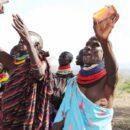Kenya camp closures no surprise to refugees: “We’ve been crying out but no one heard”
If Dadaab were a town, it would be Kenya’s third biggest by population.
Many refugees say life has been getting harder in the camps for the past few years. Credit: Moulid Hujale.
Kenya’s announcement earlier this month that it planned to shut down its refugee camps may have seemed sudden to outsiders, but it was no surprise to the hundreds of thousands of refugees living in Dadaab and Kakuma, two of world’s largest refugee camps.
In Dadaab, in northeast Kenya, many believe the authorities have long been trying to make life more difficult as a way to encourage refugees to return home.
“The way things have been going on, it was clear to us that we are being pushed to the wall,” says Abdullahi Osman, one of Dadaab’s refugee leaders. “We are not surprised to hear of the closure of the camp. We have already felt the burn.”
Over the last few years, for instance, there have been up to 50% cuts to food rations, healthcare has deteriorated, and the shelters in this isolated arid region have remained poor.
When Kenya announced the shutdown of camps, it also officially disbanded the Department of Refugee Affairs (DRA), a key partner with the UN refugee agency (UNHCR) in running the day-to-day activities of the settlements. However, refugees say that DRA services were already sporadic.
Furthermore, one week before Kenya’s directive, UNHCR-Dadaab announced it would be closing one of the camp’s main hospitals due to funding shortages. This news was met with frustrated protests within the camp, and many refugees saw it as a direct attempt to make conditions even more unbearable. Some even say they feel like aid agencies have been colluding with the government by scaling down humanitarian services, though the organisations strongly deny this and point to severe funding shortages.
Nevertheless, given the direction things have been moving the last few years, Kenya’s recent announcement simply felt like the final nail in the coffin to many of Dadaab’s residents.
“We have been crying out a lot, calling on the international community to come to our rescue but no one has heard our voices,” says Osman.
Double displacement
Dadaab was originally set up as a temporary settlement following the start of Somalia’s civil war in 1991, but in the intervening years it effectively became permanent. It has now been in existence for a quarter of a century and is home to around 350,000 people − if it were classified as a town, it would be one of Kenya’s five biggest by population.
Yet over the last few years, the Kenyan government has repeatedly spoken of shutting down Dadaab, claiming it to be an economic burden and refuge for terrorists.
The evidence for both these assertions, however, is weak. For instance, Kenyan authorities collect millions of shillings every year from businesses run by refugees, a 2010 study found the total economic benefits of the camp to be $14 million per year (or about 25% of annual per capita income in North Eastern province), and economic activity in the camp is impressive despite severe restrictions. Additionally, the Kenyan government shoulders just a tiny fraction of the costs of running the camp.
Meanwhile, in terms of security, Dadaab residents have typically been the victims rather than the perpetrators of terror attacks. Refugees are generally very hostile to al-Shabaab, they see Dadaab as their only home, and several camp leaders have been killed while volunteering alongside Kenyan police and UNHCR to protect the settlement.
Nevertheless, anti-refugee rhetoric has gained political currency, and in 2013, a controversial and rushed tripartite agreement was signed between Kenya, Somalia and the UNHCR in order to facilitate “voluntary” repatriation for Somali refugees to areas in Somalia deemed safe.
Although some areas within these zones were relatively conducive for return, not all refugees had somewhere to live upon return or sustainable livelihoods. Barely 14,000 have returned since the exercise began in December 2014, and many of these ended up being displaced a second time and fleeing back to Dadaab, pointing to the ongoing risks.
Amino, a depressed and weak pregnant mother, was one of those. Only a few months after she returned with her family to her house in Baladweyne in south-central Somalia at the end of last year, four armed men attacked them, raped her, and killed her husband.
“I pleaded to them that I was pregnant but they never listened to me,” she says as she sits on a tattered mat with her two children. “They ordered us to leave the house with immediate effect, claiming that it belongs to them. My eldest daughter is still missing.”
While Somalia may be making progress on various fronts in combating al-Shabaab militants, Amino and many others’ experiences of double displacement suggest that returning even to areas deemed safe is still full of dangers. And this is not even to mention the additional complications if all Kenya’s 600,000 refugees were to return home around the same time.
An impossible choice
Amino is now back in Dadaab, but has had to register again from scratch. Another omen of the camp’s impending closure was that last month, prima facie refugee status for those from Somalia was revoked. This means that those fleeing from the country need to apply for asylum on a case by case basis, a long process in which they have no right to shelter, food or medicine and are subject to removal by security forces.
In many ways, Amino’s story represents the impossible choice facing Kenya’s refugee population as a whole: keep battling to survive amidst increasingly unliveable conditions in the camps; or risk everything by returning to still unstable regions.
Kenya too faces a choice: to continue demonising refugees and shut down the camps, endangering hundreds of thousands of people’s lives; or to harness the energy and economic activity of refugees by giving them the right to employment and freedom of movement.
Nairobi seems to have happily stumped for former, but the choice for refugees like Amino is much tougher and perilous.
“I never thought I would face such dangers when I returned to Somalia, but coming back to Dadaab has proven to be even more life threatening,” she says.
Moulid Hujale is a Somali journalist, mainly covering humanitarian news and the Horn of Africa. Follow him on twitter at @MoulidHujale







You should cut Kenya some sluck, don’t you think so? The International Community has failed to fund the refugee program channeling money to the Europe Refugee Crisis: Hospital closure is as a result of this.
Dadaab was set up in 1991. 25 years later, not even a word of appreciation from Somalis. You should always be thankful for what help, however little, that you may have received from the hospitality of Kenyans.
Really???
Kenya has ‘tangible” economic benefits from refugees??
If you care so much for the refugees…
Please transfer them to Britain, EU or USA.. and lets see how those economic benefits will flow to those countries.
it is very sad to hear this story, the world is so unsympathetic and the Somali government may not stabilize in the near future so the policy of the international community is to starve them untill they go back to Somalia to start killing themselves again and block the road when they want to return ,that is genocide.Kenya should not take that route.
All I hear from the Somali “refugees” is blame, complaints and an attitude of entitlement, they need to at least learn to say thank you to Kenya which has been faithfully hosting them for 25 years. Who would host a guest in their home for that long while all they hear is “I want this, I want that and I want those, now!”? If not for the lazy, freeloading, bummy, criminal and terrorist activities of the Somalians, Kenya would be happy to keep hosting them. I’m sure Kenya would be happy to receive some cheese with the gallons of ‘whine’ the Somalians are serving. A little gratitude goes a long way. It’s time for Somalia to get its act together and take care of its own people and problems. Kenya has had ENOUGH of their ungrateful, entitled, lazy attitudes and shenanigans!!!!
Also, what’s the problem in Somalia(ans)? How can such a homogenous society like Somalia fail to get along, come together and elect a working government without intervention of other African Security forces? Why should other Nations be left with the job of babysitting Somalia for years and years while all they do is whine, freeload, kidnap, pirate, kill and terrorize their way to wealthy status while living like bums? It’s time for Somalia to grow up, get civilized or move to Saudi Arabia and join the Caliphate that they so want and desire.
Kenya or the West don’t have enough room to resettle and feed these troublemakers!!!
It should be possible to move back to Somalia, either as individuals back to their original homes, or as a relocation of the camp to a region inside Somalia. What should be clear is that either way, is the only way and Somalia people need to address the matter of their nation themselves.
Seriously! Some people write articles in the comfort of their air conditioned offices, visit the Internet as their primary source of data to justify their predetermined opinions. Am a kenyan and i can tell you these people kenya is hosting will never do the same in their country if kenya was burning. Make a visit to a place in Kenya that is occupied by somalis and count citizens from other parts of the country living amongst them.
Woo! Kweli Xenophobia is ripe in these comments. May a politician not rise (Trump style) who will ignite these frustrations…perhaps we can build a 10 feet wall at the border (lolz). Kenyan’s can we engage our minds as opposed to this knee-jerk stereotyping and xenophobia
Please Mr President Huru kinyatta not closed the camp Dadaab before I’m refugees Congolese is living in camp Dadaab Kenya not somaliens only is different nationality congolais. Ethiopian, erithrea. Zanzibar Tanzania, soudanais. And somali Batu
Kenya’s stance is indicative of the poor international coordination and support regarding refugee burden sharing. There are more refugees and displaced than ever before, and Europe (a major donor source) are now concerned about their own refugee problems. Less money for Kenya. But Kenya has been a major host nation for years, even when they have had their own development challenges. This is likely just a bluff to ensure more funds and effort from other nations. We need something more systematic to ensure systematic burden sharing – and not just closing borders (a la Australia et al).